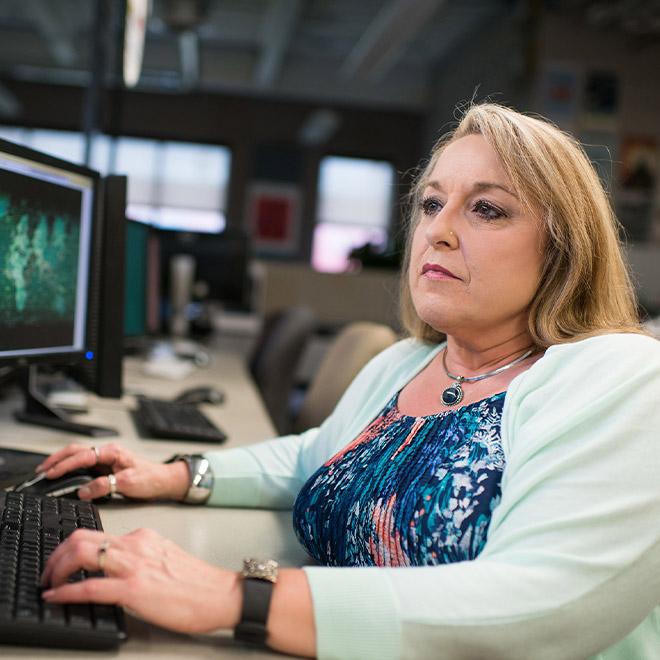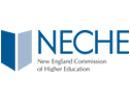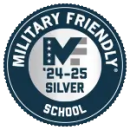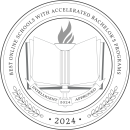CMIT-135
Build the Future with Computer Science Fundamentals
Develop a strong foundation in programming, data structures, and emerging technologies with Champlain College Online’s Associate’s in Computer Science. Designed for problem solvers and innovators, this program equips you with technical and analytical skills to tackle real-world computing challenges and prepares you for entry-level roles or further study in the field.
Finish your program faster with credit for prior learning and experience.
Differentiate your degree and get your resume noticed with a certificate. Speak with your advisor for information.
Start Your Tech Career with a Strong Foundation
- Programming Essentials: Dive into Python and C++ to develop software solutions, implement algorithms, and solve computational problems
- Operating Systems & Database Management: Gain hands-on experience with Linux, relational databases, and SQL to manage and optimize system performance
- Data Structures & Algorithms: Learn fundamental computing principles, including loops, conditionals, functions, and object-oriented programming
- Emerging Technologies: Explore blockchain and quantum computing fundamentals to understand their real-world applications and future potential
- Technical Communication: Develop the ability to articulate complex computing concepts to technical and non-technical audiences
Note: All programs, undergraduate and graduate, must be submitted individually to the Department of Veterans Affairs for review and approval before students can utilize their G.I. Benefits to pay for them. This program is currently awaiting approval. To learn more about the process, visit the VA School Program Approval page on the VA website. If you have any questions, please feel free to contact your enrollment coach or email us at onlineadmissions@champlain.edu
Program Curriculum
Learn more about Champlain's 100% online computer science associate degree, designed for working professionals.
Champlain's online computer science courses encompass the top skills needed by today's IT professionals. Graduates of the program are required to complete the following courses.
Professional Courses (27 credits)
General Education Courses (21 credits)
General Electives (12 credits)
Note: Some of the courses in this program are available in 15-week terms only. Please contact your advisor for details and information on how this may impact your time to completion.
From day one, students in this course are problem solving, first in terms of algorithmic design and then as early as week two via programming in the latest version of Python, using PyCharm. Students begin by writing a program to have a conversation, having strings and numbers as input, and advance, by week seven, to building a working password saver program, capable of looking up, adding (and encrypting), and storing passwords.
This course, through guided research and hands-on learning experiences, provides students with an understanding of operating systems, including their core fundamental principles and how they work. Students are introduced to the three most popular operating systems for personal computers (Windows, OSX and Linux), and mobile operating systems, and learn about standard functions such as memory, process/thread, input/output, storage and device management.
Learn the basics and more in this course on Relational Database Management Systems (RDBMS) and SQL (Structured Query Language). Students propose a final project in the first module and then work, week-by-week, to design, create, and populate the database. Then, students learn to create queries and stored procedures.
Blockchain technologies used in distributed environments can improve security. In this course, students will learn blockchain basics: the structure of blockchain, the role of cryptography, consensus mechanisms and their roles, and blockchain forks types and classification. Students will also identify how blockchain technologies are currently being utilized by various industries, and be introduced to smart contracts as well as how blocks are mined.
Prerequisites
Quantum computing is changing the way we process information. In this course, students learn to distinguish quantum computing from classical computing, and are introduced to the fundamentals of quantum computing, including gates, circuits, algorithms and error correction. Students also consider the impact of quantum computing on software development, and current and future uses for the technology.
Students will explore foundational concepts of calculus as they investigate limits, derivatives, and integrals, applying the product, quotient, and chain rules for differentiation and integration to algebraic, exponential, logarithmic, and trigonometric functions. Through problem-solving and real-world applications, students will analyze and optimize functions, sketch curves, and compute areas under graphs for both definite and indefinite integrals, and integrate by substitution and by parts.
A hands-on course covering key components of the Linux operating system. Through hands-on activities students will gain a working knowledge of the Linux operating system. Topics include installation and configuration of Linux, using common commands and graphical interfaces, installing common server applications, User and group account management, as well as performance monitoring and security systems.
Prerequisites
CMIT-140
This course will introduce students to programming concepts, using a major industry programming language, C++. SDEV-240 covers the history of programming languages, the essentials of the C++ programming language, and how to write effective and efficient programs to solve a variety of real-world problems.
Prerequisites
CMIT-135
The focus of this course is to cover the robust and powerful features of C++ and Object Oriented Programming. These skills will serve as a foundation to transit to develop Client/Server, Database driven applications and simulations.
Prerequisites
SDEV-240
This course introduces students to the foundational concepts needed to communicate effectively in writing for academic study and professional development. Students will also learn to read critically to evaluate an author's message. Students will be introduced to rhetorical modes and their role in the development of written communication. Students will also learn how to use revision strategies to create written communication that meets its intended purpose for its intended audience
This course builds on students' proficiency in the writing process and rhetorical modes to introduce the use of sources in written communication. Students will practice information literacy as they learn to determine information needs from sources, develop effective search strategies, and incorporate sources in written communication, legally and ethically.
Prerequisites
Complete ENGL-100
Starting with a frame of human communication as a dynamic system of interactions in which people make choices that impact their relationships, other people, and themselves, students will define theory-informed communication concepts and processes, and critically examine how they apply to everyday life across a variety of contexts. Students will reflect on how the theory, concepts and processes apply to their own lives in becoming competent communicators who are knowledgeable, skilled, and versatile.
Students will learn and apply critical inquiry skills to analyze persuasive communication created by others and to develop persuasive communication/arguments of their own to solve problems in professional, civic, social, and personal contexts. Specifically, students will learn to recognize fallacies in logic; apply inductive and deductive reasoning strategies to the interpretation and development of persuasive communication; evaluate the validity of sources; and develop logically sound persuasive communication. Students will explore the roles of self-awareness, empathy, and ethics in the context of critical inquiry and the development of arguments.
Prerequisites
Complete ENGL-110.
This course covers the fundamental concepts of linear algebra and analytical geometry, including matrices, vectors, linear transformations, and systems of linear equations. Students will also explore the analytical geometry of Euclidean spaces, including lines, planes, circles, spheres, and conic sections. In this course, students will develop their mathematical reasoning skills and learn how to apply these principles to solve real-world problems.
In this course, students will gain an introduction to classical mechanics and learn about motion, force, energy, and momentum. The course covers vectors, scalars, and coordinate systems, as well as kinematics in one and two dimensions, Newton's Laws of Motion, circular motion, and kinetic energy and work. Students also learn about potential energy and energy conservation, collision theory, rotational motion, moment of inertia, torque, rotational dynamics, and angular momentum.
With pressure and release, a window opens and closes, recording light on a sensor. The simple action captures the instinct, judgement, and skill of the person behind the lens. This class will begin a study of the art and craft of photography. Students will develop their vision and their understanding of how to achieve it. Solid skills will be learned and many doors will be opened.
A survey of the continuing change experienced in art since the 15th century. Students will examine how an image is achieved as well as the significance of the subject represented. Individual inquiry concerning the nature of art is encouraged.
Students learn to appreciate films through the critical analysis of various elements of mise-en-scene, cinematography, editing and sound. The course introduces the conventions of classical Hollywood cinema, considers the work of one major director (auteur), and surveys selected international and independent films. Students view and discuss films each week.
Students in the course will explore the cultural history of the music genre broadly referred to as rock. Students will explore the social, economic and political contexts that are influenced by and that influenced each style in the United States. By listening, watching, reflecting upon, discussing and writing, students will explore how music takes on meaning, personally, and culturally. Topics and themes include the relationships between and among gospel, country, funk, folk, disco, rap and hip hop; the role of business and technology in those relationships, and political or transgressive elements of rock music.
This course introduces students to the fundamentals of substantive criminal law. With this foundation for understanding the legal system students will identify the essential elements of crimes, including the criminal act, criminal state of mind, and jurisdiction. They will examine the rationale underlying criminal law, factors affecting criminal responsibility, and legal defenses. By analyzing real-world scenarios, students will develop skills to distinguish lawful from unlawful actions and prepare for advanced studies or careers in criminal justice.
This course focuses on the rules and procedures governing how the American criminal justice system must process individuals suspected, accused, and convicted of law violations.
In this course, students will explore the theory and fundamentals of criminal investigation, emphasizing practical applications for evidence handling and case development. Students will review basic responsibilities of investigators and protocols for report writing, evidence collection, and preparation of cases for trial. The curriculum examines investigative approaches for various crime categories, including violent offenses, property crimes, terrorism, and hate crimes, while introducing comparative perspectives from diverse legal systems.
Prerequisites
Take CRIM-120.
Principles of Economics introduces the fundamental concepts of economics - the study of how people manage resources, and how they react to scarcity. This course focuses on both microeconomics (the behavior of consumers and companies) and macroeconomics (large-scale economic factors such as employment and interest rates), so that you'll gain a broad understanding of how a modern market economy functions, how decisions in business settings are informed by economics, and how economics applies to your everyday life.
Students will study important themes in the social history of the United States since the Civil War. This course allows students to expand their critical thinking skills through an examination of primary and secondary sources. Themes might include: the evolving status of women; the immigrant experience; the concept of the American dream; the paradox of freedom vs. slavery; the minority experience; the tensions between social classes. Students will be evaluated primarily on writing assignments.
Students will learn how to create conditions for successful conflict engagement, a necessary skill for any professional. The course focuses on the foundational capacities to remain calm and connected with oneself and others. In this state students can access helpful ideas and responses and be their best selves regardless of environment. Improving facility for conflict creates stronger relationships and reduces fear. By the end of the course, students will understand that disagreement and difference can become a source of personal and interpersonal growth.
In this course, students will explore broad, foundational knowledge in psychology, including its history, major theorists and a survey of psychology subfields such as developmental, cognitive and social psychology. Students will also describe and assess the role of ethics and social responsibility in the study and application of psychological theory and practices.
In this class, students will explore how social relationships, groups, societies and culture develop and change over time. From a sociological theory foundation and employing the sociological imagination, students will examine the impact of social structures, institutions, and systems on individual lives. Students will apply sociological research methods to investigate sociological phenomena in their own lives.
This course explores the complex and evolving relationship between human beings and technology. Through a multi-disciplinary approach that draws on fields such as sociology, psychology, philosophy, and history, students will examine the ways in which technology has shaped human culture, identity, and values, as well as how humans have influenced and continue to influence the development, adoption and use of technology.
Additional Program Details
Graduates of the computer science associate online program will demonstrate the following industry-specific skills, knowledge, and competencies:
- Demonstrate foundational problem-solving skills Apply mathematical and computational reasoning to solve fundamental computational problems using programming principles and algorithms.
- Develop programming proficiency Write and debug basic to intermediate-level programs, utilizing structures such as loops, conditionals, functions, and classes.
- Apply core principles of operating systems and databases Analyze and apply core principles of operating systems and databases, focusing on their components, functions, and interactions, while designing, normalizing, and querying relational databases
- Explain emerging technologies Summarize the fundamentals of blockchain and quantum computing, including key structures, algorithms, and use cases, and explain their potential applications in modern computing.
- Communicate technical concepts effectively Articulate computing concepts and solutions, including data structures, programming logic, and system functionality, to both technical and non-technical audiences through clear, concise communication.
Design your own degree and enhance its value and focus by adding a certificate. Adding a certificate allows you to develop specialized skills, strengthen your résumé, and tailor your education to align with career goals. Choose from the undergraduate certificates on this page.
Note: To earn a certificate, you must speak with your advisor first. You must be officially enrolled in the certificate program before you complete the required courses in it — coursework completed prior to enrollment cannot be applied later, and certificates may not be added retroactively. Careful planning with an advisor is essential to ensure all policies and timelines are met.
Our admissions team seeks to admit students who:
- Demonstrate a solid academic foundation - a minimum 2.5 GPA is our recommendation, though exceptions may be made on a case-by-case basis for those who demonstrate a potential for academic success in other ways.
- Possess an aptitude for success in an online learning environment.
- Exhibit the ability to make a positive contribution to the Champlain College Online community.
To learn more about submitting transcripts, or requirements for home-schooled students, those educated abroad or returning students visit our Undergraduate Admissions page.
Our transfer credit evaluation team works hard to ensure you get the transfer credits you deserve, from a variety of sources including prior college credits, work experience and training, military training and experience, and more. Our goal is to help you graduate from Champlain College Online as quickly and affordably as possible. Visit our Transfer Credit Options page to learn more.
Champlain College Online's software development faculty, led by Program Director Richard Pickering, are expert practitioners in the field. Their industry expertise ensures that our software development curriculum is aligned with the needs of employers, and reflects the skills today’s software development professionals need for success. Classes led by our seasoned experts will give you real-world insight into the field, and create a rich community of career-focused learning.
Tuition & Costs
Online Undergraduate Tuition Fall '25 - Summer '26
Tuition & Costs
Online Undergraduate Tuition Fall '26 - Summer '27
* Alumni is defined, for this tuition rate, as any degree program graduate from Champlain College or Champlain College Online.
** Veteran rate effective Spring 2025, not retroactive
See the undergraduate cost of attendance and fees here
Affordability and Paying For Your Education
We provide a number of options to make your online education affordable, including preferred tuition for alumni, associate degree graduates, community college graduates, and military.
What Can You Do With an Associate Degree in Computer Science?
Technology professionals are in high demand as businesses continue to expand their digital capabilities. According to the U.S. Bureau of Labor Statistics, employment for software developers, quality assurance analysts, and testers is projected to grow 17% from 2023 to 2033*.
*Source: Bureau of Labor Statistics 2024, Computer and Information Technology
A Computer Science Associate Degree provides a strong foundation in programming, software development, and IT systems, helping graduates enter the field or continue their education with Champlain College Online’s Bachelor’s in Computer Science.
Entry-Level Positions for AS in Computer Science Graduates:
- Computer Support Specialist
- Software Tester
- Web Developer
- Entry-Level Database Administrator
- Entry-Level Systems Analyst

Why Champlain
Flexibility
"I chose Champlain because it gave me the flexibility I needed. The accelerated format offers a great way to reach your goals faster, and makes earning your degree or certificate a realistic achievement that truly is obtainable."

Academic Excellence and Recognition

Regionally accredited by the New England Commission of Higher Education

Designated as a Military Friendly School for our commitment to the military community
Ranked among the best by Tech Guide for game design and computer science

Named the among the best schools with accelerated bachelor's degrees by Intelligent.com
Meet the Program Director
Richard Pickering, PhD
- Computer Science
- Software Development
- Software Engineering & Project Management
- Web Design & Development
About
Dr. Richard Pickering is an Assistant Professor and the Program Director for Technology here at Champlain College Online. Richard has a Ph.D. in Teaching and Learning coupled with an MBA and numerous technology-related certifications.
Prior to Champlain, Dr. Pickering enjoyed a distinguished career blending pedagogical expertise with strategic leadership in program management and product development in the educational business sector.
Dr. Pickering also has held positions as Chief Executive Officer at Virtual High School Global Consortium, Chief Operating Officer at Victory Productions, various Program/Product Manager posts as well as Adjunct Professor appointments.

You May Also Be Interested In
Get Your Computer Science Program Guide
Learn what you can expect from our associate in computer science program.

Download Program Guide
I acknowledge that, by clicking the "submit" button, I am giving my express written consent to Champlain College and its representatives to contact me about educational opportunities via email, text, or phone, at the phone number above, including my mobile phone, using an automatic dialer, or pre-recorded message. Message and data rates may apply. I understand that my consent is not a requirement for enrollment, and I may withdraw my consent at any time.



